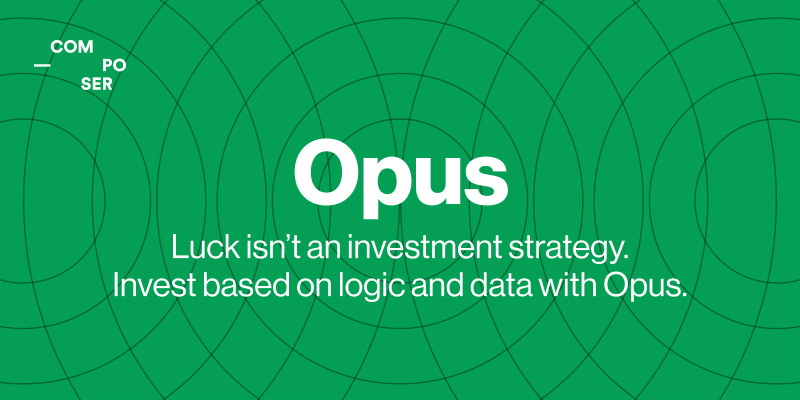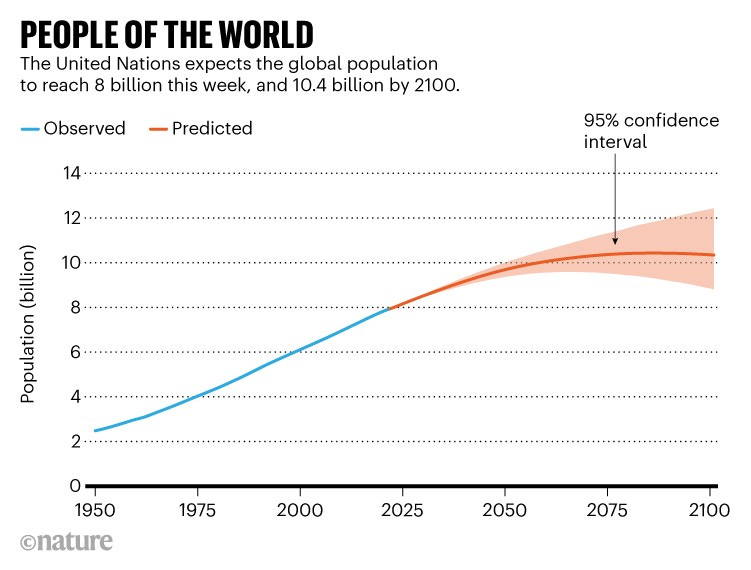Weekly Dose of Optimism #21
Artemis I, AI Creative Tools, Anton Teaches Packy, 8 Billion Humans, Things Can Always Be Better
Hi friends 👋,
Happy Friday and welcome to our 21th Weekly Dose of Optimism. Everyone always talks about the Christmas spirit — that energy in the air in the few weeks leading up to Christmas — but not enough people talk about Thanksgiving vibes. They don’t kick in as early, but they hit nearly as hard. Let this newsletter be the official start of your Thanksgiving season.
Let’s get to it.
The Weekly Dose is brought to you by… Composer
Luck isn’t an investment strategy. If you’ve read Not Boring for a while, you’re familiar with Composer — the investment app that let’s you easily build sophisticated trading strategies. Since founding its algorithmic trading platform in 2020, Composer has helped over 20,000 customers trade 100s of millions of dollars. I’m one of them — after finally admitting I’m a terrible trader, I’ve moved my public markets investing to Composer’s automated strategies.
Composer has synthesized all of this data, sifting through what works (and, importantly, what doesn’t) to create its most powerful investing solution yet: Opus. Put simply, Opus is a quantitative tool built on Composer’s vast pool of data with just one goal in mind: maximize risk-adjusted returns. Opus by Composer can help you, as a retail investor, close the gap.
It’s easy to get started. Just choose your volatility level and start investing in Opus.
(1) Artemis I Launch
“We choose to go to the moon not because it is easy but because it is hard.”
Getting back to the moon has proven harder than expected. However, after two failed attempts, Artemis I successfully launched in the early hours of Wednesday morning. The Artemis program’s long-term objective is to establish a permanent basecamp on the moon to facilitate human missions to Mars. The goals of Artemis I, an uncrewed mission, are to launch the Orion spacecraft into lunar orbit, carry 10 satellites into space, and prepare the way for Artemis II, which will perform a crewed lunar flyby. Ultimately, the Artemis program is a recommitment from the U.S. that space exploration matters and a strong sign that the U.S. will play a leading role in the burgeoning space economy.
(2) Descript + Notion Product Releases
AI is making creative work — the type of work we do here at Not Boring — easier. Yesterday, two products we use on a daily basis, Descript and Notion, launched AI-powered versions of their products. Both products, especially Descript, have relied on AI/ML for a while, but the re-vamped products rely more heavily on the Transformers flavor that has dominated this recent wave of Generative AI.
Descript is using AI to make video recording and editing a thing everyone, not just video editors, can do. It’s already an awesome product — we probably wouldn’t even do a podcast or Youtube series if Descript didn’t exist — but the new AI-powered Storyboard product looks like it will solve many of the minor frustrations we’ve had with the product.
For Notion, we admittedly have not gotten off the waitlist to try the product yet (hit us up Notion folks!) but the demo video is pretty impressive, and the product is one we could easily imagine using to help create content, alongside AI-powered tools we already use like re:collect, Lex, GPT-3, Metaphor, and Stable Diffusion.
Today, AI augments creativity. We’re a long way (although, GPT-4 could be nuts and everything is moving really quickly) from AI replacing human creativity. In a world in which creating content becomes much, much easier, our bet is that truly original thinking will stand out even more.
(3) Anton Teaches Packy AI | E2 | Chinchilla
Notion and Descript are just two of hundreds of examples of AI infiltrating the products we know and love, or powering new products altogether. Using the products is a ton of fun, but I also wanted to better understand what’s happening under the hood. Anton Teaches Packy AI is my attempt to ask all of the dumb questions that help me learn something better so that you don’t have to. Anton Troynikov, the co-founder of Chroma, has been in the space for over a decade, and explains everything with a mix of technical depth, historical context, inside baseball, and philosophy that makes it all approachable and mind-expanding.
We’re back with our second episode of Anton Teaches Packy AI. In our first episode, Anton and Packy discussed “Attention is All You Need," the research paper which kicked off the entire Transformer Generative AI wave. In the second episode, we’re back discuss to Deep Mind’s “Training Compute Optimal Large Language Models,” the basis for the Chinchillas model. The major insight of the research is that optimal large language models should scale parameters and data proportionality.
Perhaps even more exciting than the paper itself, Anton and Packy discuss the politics, competitive landscape, and major players in AI, and, if the paper is right — where exactly we’re going to get all of the necessary data to train next generation models. Check out the conversation below and support our “Pivot to Video” by subscribing to our Youtube channel.
(4) World population hits eight billion — here’s how researchers predict it will grow
David Adam for Nature
Demographers will never be sure whether 15 November really was the Day of Eight Billion, as the UN has named it, but they do agree on one thing. Although the human population has grown rapidly, that growth is slowing — and, within a few decades, Earth’s population will begin to shrink.
As of Tuesday, there are (unofficially) 8 billion of us here on Earth.
Since 1950, the world’s population has grown by nearly 4x largely due to medical advancements, lower mortality rates, and agricultural productivity. Just another reminder that, despite the doom and gloom headlines, the important things have gotten seriously better over the last few generations. Much of this population growth has occured in just two countries — China and India — which combined have increased their populations by over 1.5 billion since 1950.
But researchers predict that the population boom times are coming to end; growth has already slowed and population may actually start shrinking in fifty years, once we cross the 10 billion people mark. The likelihood of population collapse, and the impact of that collapse, is highly disputed. Elon has called lower birth rates a bigger risk to civilization than climate change, while other’s have pointed out that slowing growth does not equate to population collapse. We’re particularly interested in the incredible work being done in biotech to extend the health spans of those of us lucky enough to count ourselves among Earth’s 8 billion living people.
How you like them apples, Malthus?
From Adam Mastroianni and Ethan Ludwin-Peery, h/t Alice Albrecht
Overall, it seems, human imagination has a bias: when people imagine how things could be, they imagine how things could be better.
Two researches ran eight studies to determine how people perceive “good” and “bad.” The major finding: when people imagine how things could be different, they almost always imagine how things could be better. Controlling for a bunch of different factors, such as how the question is phrased, language, pre-disposition, the results were consistent: people are biased towards imagining how things could be better. People imagine how things could be better even when it’s easier to imagine how things could be worse.
Quick example: how could your phone be different? Participants answered:
“It could be waterproof”
“My phone could be bendable and flexible”
“Brighter screen”
Despite the fact that the average cellphone today is already pretty waterproof, durable, and has a bright screen…when asked how the phone could be different, they want more waterpoofness, durableness, and brightness. Other ways your phone could be different:
It could not have access to the internet
It could only work outside
It can’t send text messages
These changes would surely make today’s phone more different, but these would also be downgrades. People imagine the potential upgrades before the downgrades.
How does this apply to us? Well for one, it means we’ll always have readers of The Weekly Dose of Optimism. People are looking for the ways in which the world can be better, and that’s the type of news we share here at Not Boring. But more importantly, understanding this bias can potentially make us more appreciative of the way things are. Our bias towards “different = better” is probably one of the human characteristics that drives towards progress more than any other, but at the same time recognizing different could = worse should leave us somewhat ore optimistic about the the current state of things.
That’s all for this week. We’ll be back in your inbox 9am EST on Monday morning with an essay we’ve been working on for a few weeks.
Packy





Finally, a writeup with substance with no mention of FTX. Thank you, Packy 🙇
On your last point regarding the use of the word different and how it translates into better. I wonder what the outcome would be if you used the word ‘change’. People often perceive that with a downside view even though it is intended for the better